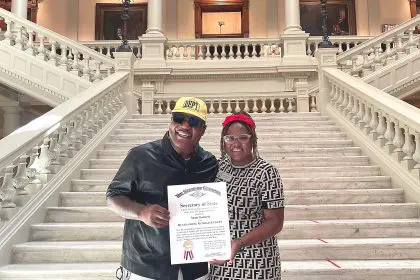 Donald Woodard is a partner at Gordon & Rees’s Business Transactions and Sports, Media and Entertainment Law practice groups, he is a nationally recognized expert with over a decade of specialty experience in entertainment, media, and technology law, including digital rights, social networking, copyright, and rights of privacy and publicity.
Donald Woodard is a partner at Gordon & Rees’s Business Transactions and Sports, Media and Entertainment Law practice groups, he is a nationally recognized expert with over a decade of specialty experience in entertainment, media, and technology law, including digital rights, social networking, copyright, and rights of privacy and publicity.
Here, the Indiana University School of Law at Bloomington graduate offers tips on retaining an attorney before the advance is received and contracts are signed. –yvette caslin
Why did you become an entertainment lawyer?
I enjoy changing people’s lives and my profession gives me the ability to do so. For example, I recently closed a deal for a young man just getting started in his life: He’s married with a beautiful six-month-old daughter and did not have much income at that point. I was delighted to inform him that I closed his record deal which yielded a six figure signing advance. What an amazing blessing for this young family.
When should an artist retain or contact an attorney?
Once you are asked to sign a written agreement it’s time to get a lawyer involved. Put another way, you should never sign a contract without first hiring independent counsel to represent your interests and negotiate the agreement on your behalf. Keep in mind, it is more expensive – and certainly more stressful for the artist – to get out of a written contract once it has been signed; both in terms of lawyer hours and what you may have to give up to obtain a release or contract modification.
When should an artist have a contract? You can’t harness creativity, what if it’s after hours and no attorney is available?
A simple songwriter split sheet or other written instrument that provides each party’s contribution to the final work. It’s important that at that time a work is created, the co-contributors agree on each party’s contribution or ownership in the final work. Often times, this doesn’t happen and the result is a split (or ownership) dispute. I always advise clients to sign a written agreement at the moment a work is created, before everyone suddenly gets amnesia, showing each writer’s contributions to the work.
What if an artist simply doesn’t have the income or money for an attorney?
Sometimes lawyers with strong industry connections are approached to represent talent before they are presented with their first written agreement. This situation is more complicated because usually the artist can’t afford to pay the lawyer at that time. Lawyers who agree to work with “developing or emerging” talent must be willing to take a financial risk that they will get paid at some point in the future IF the talent has success.
Entertainment now is a broad term. How has the industry changed?
As we all know by now, technology has had a huge impact on the entertainment industry. Specifically, we are aggressively trying to protect our copyrights and much of the action is now playing out in the court system. Individual users are getting sued for copyright infringement for illegally downloading songs without paying for them and media companies are getting raided by the government and shut down for allegedly not doing enough to prevent copyrighted materials from appearing on the websites they own and host or they are bombarded with tons of notices from copyright owners to take down allegedly infringing material which is permitted under The Digital Millennium Copyright Act.
Photo Credit: Sean Cokes










